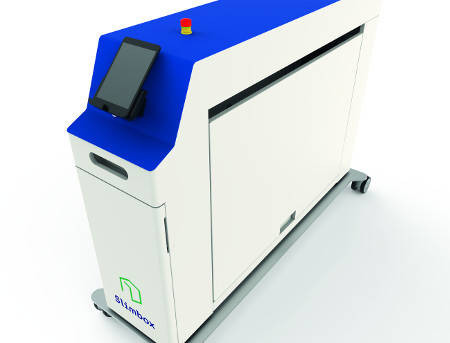Fit Things developed the Slimbox and its app to easily make custom-sized cardboard boxes for shipping. The bespoke packaging increases the efficiency of sending parcels and makes e-commerce more environmentally friendly.
The starting point of Slimbox’s development was the founders’ family printing company, where finding a correctly-sized box was always a struggle. The father and son team of Kristof, Filip and Rik Roose, with the help of advisors including Peter Somers, Kristof Braem, Pieter Verbeke and Luc Roose, developed a machine that could automatically and quickly produce a cardboard box the correct size for a shipment. Research found that packaging solutions existed for larger companies, but that there is a gap in the market for smaller e-commerce companies and individuals regularly shipping.

The result is a machine small enough and simple enough for use in offices and SMEs that produces bespoke packaging in a more sustainable and cost-effective way. Slimbox works by the user measuring the dimensions of the product, entering the measurements in the Slimbox smartphone app and then selecting the type of box required. The cardboard is inserted, the start button is pressed and a laser cuts the cardboard. A laser was selected for cutting because it has the lowest friction of cutting methods and therefore will last longer. The box is then folded and is ready to be used for shipping goods. The machine handles corrugated cardboard between 1-5mm thick and cuts to maximum dimensions of 1-2m, according to what suits the product best. Slimbox can cut any shape, from machine parts to egg timers and even users’ own line drawings. The machine can also produce personalized packaging such as logos and names, which means customers don’t have to invest in extra printing or special wrapping.
The machine reduces waste and reuses material by correctly sizing packaging, eliminating filling materials and reusing leftover pieces of cardboard. It also reduces the time employees spend on preparing products for shipping, minimizes packaging inventory and reduces the environmental impact of logistics. Filip Roose, CEO of Fit Things, the company behind Slimbox, says costs can be reduced by up to 115% with the machine, because parcels are often paid for by dimensions, especially if you are shipping internationally. On average, parcels contain 40% of ‘air’ and filling material. “We’re not saying we can make traffic jams disappear, but at least we are helping vehicles to be optimized,” he says. “One of the main challenges during the development was to make it incredibly easy to use. We took a rather complex procedure, with a lot of calculations and things to consider and have made it ultra-easy for the user.”
The machine was launched in December last year and Roose says he has been “overwhelmed” by the response to it from all over the world. The first batch of machines will be delivered in Belgium, France, Germany, UK, Netherlands and Poland, with roll-out to the rest of Europe by 2018 and the USA afterward. The machine is riding the wave of the increase in e-commerce activity in SMEs.
Roose says, “I don’t think anyone could predict how fast the parcel market is evolving. We need to upgrade it, so that it becomes more efficient, runs even faster and wastes less. “Put a machine like this in your post offices and you will not only help your customers, but also increase the efficiency in your postal company.”
Environmental Achievement of the Year Shortlist:
- Hermes carbon negative parcel packaging
- SingPost’s electronic waste and battery collection
- Mauritius Post’s envelope recycling
An interview with the award winner – Peter Somers, Advisory Board Member:
Postal Technology International Awards Winners 2017 – Environmental Achievement of the Year


